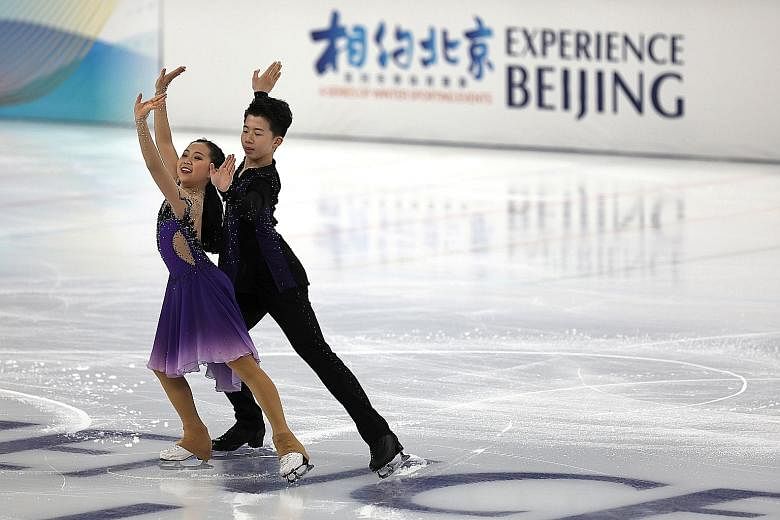BEIJING • Over the past month, diplomats in Beijing have been talking more about the pros and cons of boycotting the 2022 Winter Olympics in Beijing - particularly as leading global brands came under attack for statements on human rights abuses in Xinjiang.
While most doubted there would be an outright boycott, they noted that a lot can change before the opening ceremony 10 months from now. The diplomats, who asked not to be named, also raised the possibility that top dignitaries would stay away from Beijing.
Either way, the diplomats agreed on one thing: No country wants to be the first to call for a boycott.
The debate erupted on the global stage on Tuesday after US State Department spokesman Ned Price said a boycott was "on the agenda" and "something that we certainly wish to discuss" with allies.
White House spokesman Jen Psaki walked that back on Wednesday, saying: "We have not discussed and are not discussing any joint boycott with allies and partners."
Still, China immediately went on the offensive. Foreign Ministry spokesman Zhao Lijian said any US attempt to criticise China over alleged forced labour in Xinjiang would be met with "firm rejection and strong response" from the Chinese people. A boycott, he said, would harm the interests of athletes and "runs counter to the spirit of the Olympic Charter".
While the Beijing Olympics are not until next year, every government and foreign firm that does business in China must now take a position on participation.
As last month's government-backed boycott of retailers like H&M showed, the decision will ultimately impact their ability to access China's market of 1.4 billion people.
"There would likely be bans imposed on select imports of products from countries that signal a willingness to shun the Games and boycotts of companies from those countries," said Ms Bonnie Glaser, a senior adviser for Asia at the Centre for Strategic and International Studies in Washington. "If the US is seen as leading the boycott, it is likely that US-China relations would significantly deteriorate."
Chinese President Xi Jinping brought up the Olympics in a phone call on Wednesday with German Chancellor Angela Merkel, saying he hoped the Games could become a catalyst for more exchanges between the countries.
Chinese Foreign Minister Wang Yi also raised support for the Olympics in a call this week with his Japanese counterpart Toshimitsu Motegi.
Mr Hu Xijin, editor of the state-linked Global Times, said Washington should not dare threaten China with an Olympic boycott. "If that happens, it will be a small group of white supremacist nations pitted against the Olympic family, a display of their self-isolation," he wrote on Twitter.
Despite insistence from International Olympic Committee officials that sports and politics are separate, the Games have frequently been enmeshed in complex developments in world affairs.
Still, it is not clear how much international support there would be for a boycott. In 2008, then US President George W. Bush attended the opening ceremony of the Olympics in Beijing despite calls to boycott, according to Professor Zhou Qi, director of the Institute of Global Governance and Development at Tongji University.
"The US... will not give up an opportunity to tarnish China's image, but the chances of an actual boycott are low," she said.
But US-China tensions are much higher now, and US President Joe Biden has come under increasing pressure over what his administration has called the genocide of ethnic Uighurs in China.
Mr John Katko, a Republican congressman, said Mr Biden should push for the Games to be moved from China "to a country that embodies democracy".
Senator Mitt Romney has argued that the US should send its athletes to the Beijing Games. But, he wrote in a New York Times column last month, American spectators and politicians should stay home. US corporations, too, should not send delegations to the event, he added.
While past boycotts have occasionally helped reduce global support for countries such as South Africa under apartheid, China is a different story, according to Professor Jules Boykoff, from Pacific University in Oregon, who has written about the politics of the Olympics.
"South Africa was in a much weaker geostrategic position than China finds itself in today," he said.
BLOOMBERG

